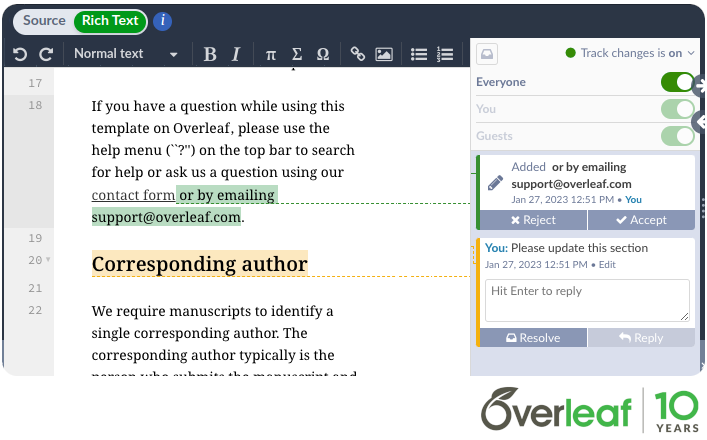As part of our 10th Anniversary celebration 🎉🎊, we sat down with Overleaf's founders John Hammersley and John Lees-Miller to take a brief look back at its history.

As part of our 10th Anniversary celebration 🎉🎊, we sat down with Overleaf's founders John Hammersley and John Lees-Miller to take a brief look back at its history.

Update: As of June 14 2023, the legacy editor has been retired for all users.
As the eagle-eyed among you may already be aware, late last year, we introduced a new source editor (the area of Overleaf where a user types in their LaTeX code). This change has enabled us to make some exciting improvements to our Rich Text (visual editing) functionality and means we can bring you other highly requested improvements and valuable new features faster.
We’ve removed the previous source editor—Source (legacy) — for some users over the last couple of months and gathered crucial feedback in the process. In late May 2023, the legacy editor will be removed entirely, so we wanted to tell you more about the changes and what to do if you hit any problems.
Our handy Tag feature (previously known as Tags/Folders) allows you to tag your projects (the clue’s in the name!) to make them easier to find, organize and share.
Now, we’ve made it easier to personalize your tags with your own choice of colors. Instead of a randomly assigned color, you can now choose from our pre-defined palette of nine colors, visually select a color in the colormap, or manually type the HEX or RGB value.

Reviewing and commenting on Overleaf projects is now even easier. As part of our latest update you can now make tracked changes and comments in our rich text editor, which has a more simplified view of the content, along with some other exciting rich text editor enhancements.

It’s hard to believe that Overleaf is celebrating its official 10th anniversary this year. 🎉🎊 We always say it, and it is true, we could not make it to 10 years without all 11 million of you! 🙏 🙏 🙌 🙌
\begin
Discover why over 25 million people worldwide trust Overleaf with their work.